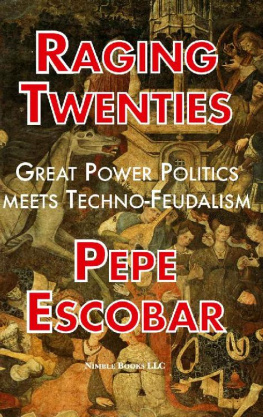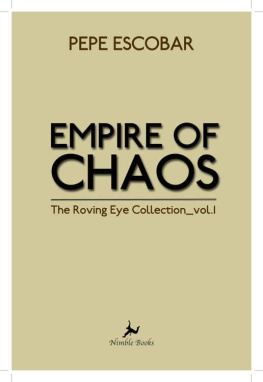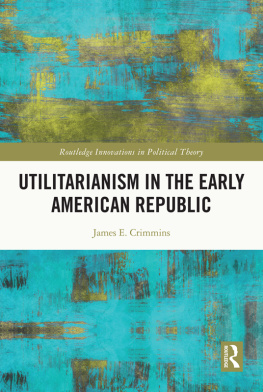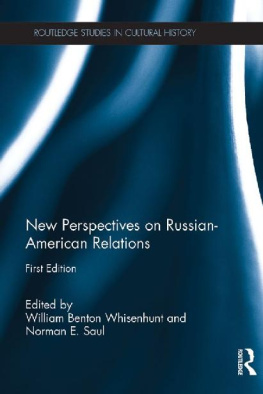Pepe Escobar - Raging Twenties: Great Power Politics Meets Techno-Feudalism
Here you can read online Pepe Escobar - Raging Twenties: Great Power Politics Meets Techno-Feudalism full text of the book (entire story) in english for free. Download pdf and epub, get meaning, cover and reviews about this ebook. year: 2021, publisher: Nimble Books, genre: Romance novel. Description of the work, (preface) as well as reviews are available. Best literature library LitArk.com created for fans of good reading and offers a wide selection of genres:
Romance novel
Science fiction
Adventure
Detective
Science
History
Home and family
Prose
Art
Politics
Computer
Non-fiction
Religion
Business
Children
Humor
Choose a favorite category and find really read worthwhile books. Enjoy immersion in the world of imagination, feel the emotions of the characters or learn something new for yourself, make an fascinating discovery.
- Book:Raging Twenties: Great Power Politics Meets Techno-Feudalism
- Author:
- Publisher:Nimble Books
- Genre:
- Year:2021
- Rating:4 / 5
- Favourites:Add to favourites
- Your mark:
Raging Twenties: Great Power Politics Meets Techno-Feudalism: summary, description and annotation
We offer to read an annotation, description, summary or preface (depends on what the author of the book "Raging Twenties: Great Power Politics Meets Techno-Feudalism" wrote himself). If you haven't found the necessary information about the book — write in the comments, we will try to find it.
In RAGING TWENTIES, Pepe Escobar smashes a triple-wide jumbo bulldozer of erudition and insight through the painfully narrow and now Big Tech-fortified Overton window of conventional American political discourse. This volume includes 25 essays written for Asia Times, Consortium News, and Strategic Culture in the incomparable year of 2020 and adds a new introduction, afterword, and table of abbreviations. Educated people of all political persusasions will enjoy Escobars stinging prose and his display of his wide-ranging and truly global knowledge of poetry, history, and political philosophy. American readers already skeptical of the dominant narrative will enjoy this scintillating dissection of the mammoth hypocrisy involved in the standard governmental and corporate narrative. And those with perspectives similar to the American mainstream will benefit from reading a truly Other-centered exemplar of the several billion people who find the political perspectives that are commonplace in Asia, Europe, China, Russia, and Iran more congenial than those of a US establishment that has gifted the world with seventy-five-plus years of continuous war.
Escobars first book in the US, Globalistan (Nimble, 2007), brilliantly anticipated the future of a disintegrating international system in an era of Liquid (hybrid) war. These were followed by Red Zone Blues (2007); Obama does Globalistan (2009); Empire of Chaos (2014); and 2030 (2015), all by Nimble Books.
From the Introduction:
The Raging Twenties started with a murder.
That lethality was amplified when a virus cannibalized virtually the whole planet, devouring time.
As time has been standing still-or imploded-ever since, we cannot even begin to imagine the consequences of the anthropological rupture caused by SARS-CoV-2.
A new world starts when language-either a living entity, or a virus from outer space (William Burroughs)-starts metastasizing new words.
A basket of concepts already stand out. Circuit breaker. Biosecurity. Negative feedback loops. State of exception. Necropolitics. New Brutalism. Hybrid Neofascism. And, as we shall see, New Viral Paradigm.
The proliferation of new words-and concepts-paradoxically developed in parallel with the slow fade out of The Word.
Cameroonian philosopher Achille Mbembe summed it all up: This end of the word, this definitive triumph of the gesture and artificial organs over the word, the fact that the history of the word ends under our eyes, that for me is the historical development par excellence.
We all now live in Google town. Suddenly, we were forced to identify the lineaments of a new regime. A new mode of production: a turbo-capitalist survival engineered as Rentier Capitalism 2.0, where Silicon Valley behemoths take the place of estates, and also the State. That is the techno-feudal option, as defined by economist Cedric Durand.
Squeezed and intoxicated by information performing the role of a dominatrix, we were presented with a new map of Dystopia, packaged as a new normal, featuring cognitive dissonance, a biosecurity paradigm, the inevitability of virtual work, social distancing as a political program, info-surveillance, and triumphant Trans-humanism.
Pepe Escobar: author's other books
Who wrote Raging Twenties: Great Power Politics Meets Techno-Feudalism? Find out the surname, the name of the author of the book and a list of all author's works by series.








